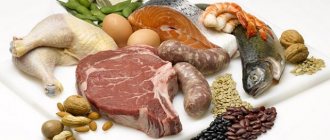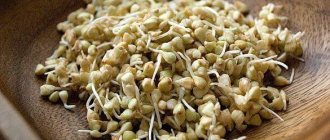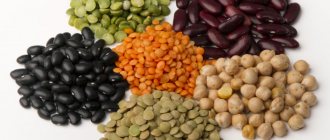By consuming enough calories throughout the day, we provide the body with the energy it needs to function.
Remembering the amount of BJU and calorie content in food during weight loss, people incorrectly calculate the daily requirement of BJU for the body. Misconceptions The consumption of fats, proteins and carbohydrates per day during a diet leads to incorrect results. And a specially low carbohydrate intake can cause a deterioration in well-being. How to correctly calculate the amount of carbohydrates per day for an adult, what you need to know about it, is described in the article.
Why does the body need carbohydrates?
Carbohydrates are organic substances consisting of hydrogen, carbon and oxygen. A person is able to generate a source of energy on his own, but the main supply of strength comes from eating food.
Cereals contain 85% carbohydrates, sugar – 99%.
Carbohydrates are divided into 2 types:
- simple;
- complex;
The first type is found in sugar, honey, and sweets. Such substances are easily absorbed by the body and enter the bloodstream. Doctors recommend consuming these products in small quantities.

Complex carbohydrates include starch, fiber, dietary fiber, etc. They are absorbed more slowly. They are allowed to be consumed in sufficiently large quantities.
Functions of carbohydrates in the human body:
- provide energy;
- strengthen tissues;
- prevent the growth of bacteria in the stomach;
- break down fats;
- normalize the functioning of the immune system;
- participate in the formation of enzymes and the production of hormones.
What is important to know about carbohydrates to lose weight
The process of losing weight occurs when energy sources do not enter the body. It needs nutrients, which it takes from fat deposits.
Important! Eating excessive amounts of sugary foods increases insulin levels in the blood, which slows down the weight loss process.
Nutritionists strongly recommend avoiding the following foods:
- flour products and potatoes;
- chips, crackers, instant noodles, cereals;
- sweets;
- carbonated drinks, tea with sugar, coffee;
- fruits and berries rich in fructose: bananas, nectarines, plums.
Tips for losing weight

When losing weight, you need to intelligently approach the distribution of nutrients. For those who want to lose extra pounds, there are several tips from nutritionists:
- Instead of exhausting and heavy diets, it is better to calculate the BJU.
- The daily intake of carbohydrates should not be lower than 140 grams.
- Consumption of fats is necessary for proper functioning of the immune system.
- The daily requirement for fat is 30 – 40 grams.
- Don’t forget about the water you need to drink per kilogram. For 1 kg of weight 20 milliliters of water.
- If you are overweight, you should give up sweets in favor of fruits.
If you work on yourself correctly, your weight will easily return to normal.
Calculation of the amount of carbohydrates per day
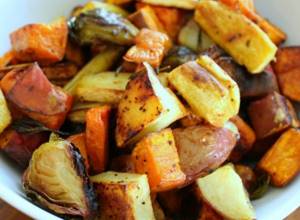
In order to find out the daily norm of energy sources, it is necessary to calculate how many calories a particular person should consume. Based on this figure, you can calculate how much carbohydrates he needs to receive.
Number of calories per gram of each macronutrient:
- Proteins – 30% of calories. 1 gram = 4 kcal.
- Fats – 30% of calories. 1 gram = 9 kcal.
- Carbohydrates – 40% of calories. 1 gram = 4 kcal.
If a person’s norm is 1500 kcal, then the table of proteins, fats and carbohydrates will look like this:
- proteins: (0.3*1500/4) = 113 g;
- fats: (0.3*1500/9) = 50 g;
- carbohydrates: (0.4*1500/4) = 150 g;
It is difficult to adhere to exact numbers, so an error of 5% of the established norm is allowed.
Carbohydrates: daily requirement
The required amount of energy sources depends on a person’s gender, weight and age.
Be sure to read: Nutrition for obesity: menu for every day with recipes for weight loss, list of products
More details about the daily diet can be found in the table:
| Category | Weight | |||
| 40-50 kg | 50-60 kg | 60-70 kg | 70-80 kg | |
| Man gaining weight | 283 g | 294 g | 305 g | 322 g |
| Man losing weight | 159 g | 163 g | 168 g | 173 g |
| Man maintaining body weight | 210 g | 287 g | 303 g | 323 g |
| Woman gaining weight | 203 g | 242 g | 258 g | 271 g |
| Woman losing weight | 118 g | 150 g | 165 g | 153 g |
| Woman maintaining body weight | 145 g | 187 g | 205 g | 217 g |
Energy value of food
The energy released is measured in kilojoules and is called calories. It is necessary to consume the daily norm of energy value.
Otherwise, the person loses or gains weight.
- Proteins: 1 gram = 16.7 kJ.
- Fat: 1 gram = 37.7 kJ.
- Carbohydrates: 1 gram = 16.7 kJ.
Based on these data, you can calculate the energy value of any product. Using wheat bread (second grade) as an example, let’s find the number of calories in 100 g.
It contains 7.1 g of protein, 1.1 g of fat and 46.4 g of carbohydrates. The energy value will be equal to: 16.7*7.1+ 37.7*1.1+46.4*16.7=934 kJ (234 kcal). The calorie content is written on packages of goods, but with fruits, vegetables and flour products you will have to calculate it yourself.
Daily calorie content is determined by the sum of the energy value of food eaten per day.
What carbohydrates can you eat while losing weight?
When losing weight, it is necessary to exclude simple carbohydrates and consume complex ones. The latter are capable of dissolving into elemental sugar for up to several hours.
The breakdown of these organic substances occurs without increasing insulin in the blood, thanks to which a person does not feel hungry. The body spends a large amount of energy processing such products, burning extra pounds.
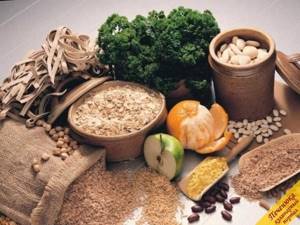
When losing weight, it is necessary to exclude simple carbohydrates and consume complex ones.
The diet must include food containing glycogen, starch, fiber, insulin and pectin. These substances are enzymes that can quickly break down glucose. Their responsibilities also include removing toxins from the stomach and intestines.
Products necessary for a diet containing “good” carbohydrates:
- whole grain bread or bran;
- pasta;
- cereal porridges;
- vegetables (carrots, beets, potatoes, onions);
- beans, soybeans, peas;
You can’t categorically refuse sweets. It is recommended to eat only real dark chocolate.
Fibrous carbohydrates
Fibrous carbohydrates must be eaten during a diet, as they are low in calories, but quickly fill a person. This type also burns fat well.
They are most often found in green vegetables:
- cucumbers;
- broccoli;
- asparagus;
- mushrooms;
- tomatoes;
- pasta;
- Red beans.
To quickly lose weight, girls use lean proteins and fibrous carbohydrates in their diet.
This combination gives quick weight loss, but if a person needs to gain muscle mass, then he should not eat food with these organic substances.
Sweet carbohydrates
This is the name given to simple carbohydrates that have a sweet taste.
Excessive consumption of products containing such an organic compound is harmful to human health. They are quickly broken down in the blood, producing insulin, which is then converted into fat cells.
When dieting, you should avoid foods containing glucose, fructose, and sucrose:
- confectionery;
- sweet carbonated drinks and juices;
- semolina and rice porridges.
Attention! After drinking a small can of Coca-Cola, a person consumes 9 tablespoons of sugar, a cup of latte – 7 tablespoons.
Starchy carbohydrates
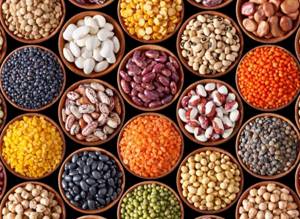
Starchy carbohydrates help you not feel hungry for a long time. With limited consumption of starchy foods, a person will not gain weight.
These include:
- oatmeal, barley;
- rice, buckwheat;
- legumes (peas, beans).
Rules for consuming healthy carbohydrates for weight loss
Healthy carbohydrates are complex organic substances; they are the ones that need to be included in your diet when losing weight.
You need to know a number of rules, without which the desired result cannot be achieved:
- Simple carbohydrates should make up only 15% of the components consumed. The remaining 85% is starchy.
- It is necessary to eat vegetables and fruits rich in fiber.
- To lose weight, it is important to consume proteins together with carbohydrates, as they will help gain lean body mass.
- You should not eat a lot of food at one time. It is better to break your meals into several parts and eat in small portions.
- Confectionery products are best consumed in the morning, before lunch. In the evening, sucrose is poorly absorbed by the body, which causes unnecessary fat mass to appear.
When creating any diet, it is necessary to include a combined set of products. You can’t eat just one thing, like rice. When dieting, it is necessary to include vegetables and grains in the diet.
How many carbohydrates do you need per day when losing weight?
Depending on how long a person wants to lose excess weight, nutritionists draw up the daily intake of foods containing carbohydrates:
- 100-150 g. Average value, which is suitable for maintaining mass. Further reduction in the norm will lead to weight loss.
- 50-100 g. By taking this amount of carbohydrates, a person will begin to lose kilos without feeling it. It is only important to maintain a diet and eat food that does not leave you feeling hungry for a long time.
- 20-50 g. This amount will lead to weight loss in a short time.
Important! You cannot start losing weight without the help of a nutritionist, as a lack of substances can lead to serious disorders in the body. A famous example of the consequences of dieting is anorexia. In most cases, if this disease is not overcome, death occurs.
The type of life a person leads plays a big role. During physical activity, nutritionists believe that it is necessary to consume 4 g of carbohydrates per kilogram of a person’s weight.
It is important to exercise, otherwise the weight will not come off. In the absence of physical activity, the norm drops by half - to 2 g per kilogram of body weight.
Energy value of food
The daily intake of BJU should not be harmful to health, and in order to reduce the amount of fat contained in the body, it must be correctly calculated. Often, while leading a healthy lifestyle or going on diets, people forget that the body needs carbohydrates just like any other nutrients. The correct calculation is based on three main indicators: age, height, weight. Nutrition must be balanced, otherwise health problems will arise.
Consequences of a lack of carbohydrates
With a lack of carbohydrates, the body begins to signal a malnutrition. First of all, the body begins to take energy from proteins. Because of this, they cannot perform their functions: synthesize new cells and tissues, produce antibodies and hormones.
Many diets are based on eliminating foods rich in carbohydrates. However, their absence in the body can disrupt the process of burning fat deposits, and the person, on the contrary, will gain weight.
Due to the lack of these components, a person experiences nausea, accompanied by vomiting, headaches, lethargy and fatigue.
Squirrels
Protein is an essential component of all tissues of the human body. In a child’s body they are needed for growth, in an adult – for tissue regeneration. All proteins contain various amino acids, each of which is simply necessary for humans.
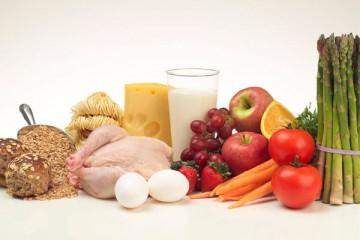
The primary sources of protein, which have a unique set of amino acids, are nuts, sprouted grains, soy milk, white meat chicken or turkey, fish, low-fat cheeses or other fermented milk products, and milk.
Calculation of calorie content and ratio of BZHU
To maintain or lose weight, it is important to know how many calories you need to consume daily.
You can use the following simple algorithm:
- Multiply the mass of a person by 10.
- Human height multiplied by 6.25.
- Add the results of steps 1 and 2.
- Number of years multiplied by 4.9.
- Subtract the result of the calculations in step 4 from the number obtained in the calculation of step 3.
- For men, add the number 5 to the result of step 5, for women, subtract 160.
- The resulting number in step 6 is multiplied by the physical load coefficient:
- In the absence of physical activity, it is equal to 1.2.
- If a person walks a lot, sometimes goes to the pool or does exercises at home, then the coefficient is 1.4.
- If you exercise several times a week – 1.6.
- If a person trains daily and is highly active, then the result obtained in step 6 is multiplied by 1.7.
Protein products
Proteins serve a person to convert fats into energy.
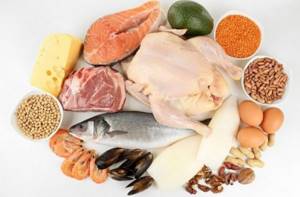
Protein products
When losing weight, it is important to eat foods containing proteins (meat, fish). The components included in these products help to gain muscle mass and also cleanse the body of waste and toxins.
Benefits of eating protein:
- improvement of heart function;
- decreased feeling of hunger;
- removal of excess fluid, which can be deposited in the form of fat reserves;
- improvement of metabolism.
Allowed foods include: chicken, seafood and low-fat dairy products. Among vegetables and fruits, eggplants, avocados, and apples are rich in proteins. A protein diet helps you quickly get rid of extra pounds, but other organic components cannot be completely eliminated.
Fats: get rid of them or leave them
It is not recommended to completely give up fat during a diet, as the person will have difficulty thinking and feel tired.
When dieting, it is recommended to consume foods containing omega-3 fatty acids: salmon, tuna, cabbage, walnuts, parsley.
They perform the following functions:
- improve human memory;
- reduce the likelihood of developing cancer;
- fight fatigue;
- reduce the load on the heart and joints;
- increase skin protection, reducing the load on the skeleton.
Fats
It is a big misconception to believe that consuming fat can only harm yourself and your figure. The main thing is that there should be moderation in everything. Fats are simply necessary for the human body, because without them many cells will not be able to function normally.
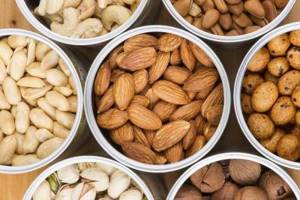
All fats that exist in nature are divided into saturated and unsaturated, this is determined by the ratio of fatty acids and glycerol in the composition.
For normal functioning, the body needs three main polyunsaturated fatty acids - Omega-3, Omega-6 and Omega-9. You can find them in fish, pumpkin seeds, and vegetable oils (olive, almond).
Saturated fats, selected in strictly defined quantities, saturate the body with the necessary energy. However, be careful, a large amount of saturated fat in food contributes to increased cholesterol deposition on the walls of blood vessels.
